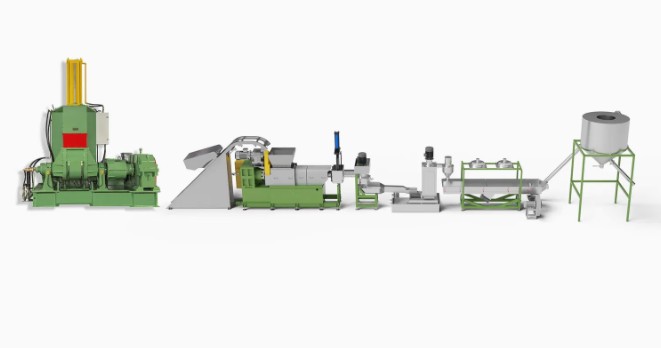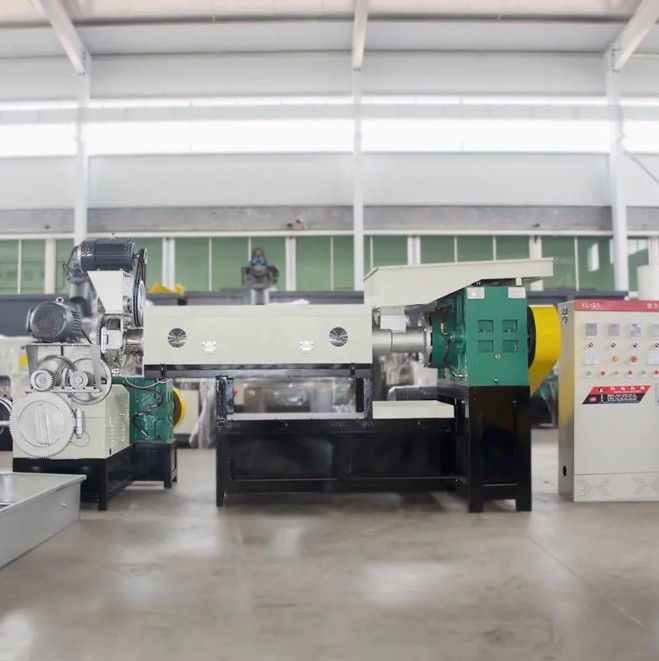Low-priced new products launched - Waste Plastic Granulators
Product description
A waste plastic granulator machine is an industrial-grade equipment designed to recycle discarded plastics into uniform granules, ready for reuse in manufacturing. This machine plays a pivotal role in addressing global plastic pollution by transforming post-consumer and post-industrial waste such as bottles, packaging films, automotive parts, and electronic casings into high-quality raw materials. By converting waste into reusable pellets, these granulators support circular economy initiatives, reduce landfill dependency, and lower the demand for virgin plastics.


Key Features of Waste Plastic Granulator Machines
Advanced Shredding Mechanism
Utilize high-torque rotors and hardened steel blades to efficiently shred tough and bulky plastic waste.
Adjustable cutting speeds accommodate diverse materials from rigid plastics (e.g., PVC pipes) to flexible films.
Durable and Corrosion-Resistant Build
Constructed with wear-resistant alloys and stainless steel components to withstand abrasive materials and harsh operating conditions.
Multi-Stage Processing
Some models integrate crushing, washing, and drying systems to handle contaminated or mixed plastics, ensuring clean and pure output granules.
Customizable Granule Sizes
Interchangeable mesh screens (2–12 mm) allow precise control over pellet dimensions, meeting specifications for extrusion, injection molding, or 3D printing.
Energy-Efficient Operation
Equipped with energy-saving motors, smart load sensors, and variable frequency drives (VFDs) to minimize power consumption.
Safety and Automation
Features include emergency stop buttons, automatic overload reversal, and PLC-controlled systems for safe and user-friendly operation.

Applications of Waste Plastic Granulators
These machines are integral to industries focused on sustainability and resource efficiency:
Recycling Centers: Process municipal plastic waste (e.g., bottles, containers) into granules for resale or reuse.
Manufacturing Units: Recycle production scraps (e.g., sprues, rejected parts) from factories to reduce raw material costs.
E-Waste Management: Recover plastics from discarded electronics, appliances, and cables.
Agriculture: Recycle used mulch films, irrigation pipes, and silage bags.
Textile Industry: Repurpose synthetic fiber waste into pellets for new fabric production.
Q1: Can this machine process heavily contaminated plastics (e.g., with dirt or metal)?
A1: While basic granulators require pre-cleaned materials, advanced models may include magnetic separators and washing systems to remove contaminants. For optimal results, pre-sort and clean waste plastics to avoid blade damage and ensure pellet purity.
Q2: What types of plastics are NOT suitable for granulation?
A2: Plastics with hazardous additives (e.g., PVC with chlorine) or thermoset plastics (e.g., vulcanized rubber) cannot be recycled via standard granulators. Always verify material compatibility with the machine’s specifications.
Q3: How noisy is a waste plastic granulator during operation?
A3: Noise levels vary by model, but industrial granulators can reach 75–85 dB. Look for noise-dampening features like insulated chambers or soundproof enclosures especially for indoor installations.
Q4: What is the average production capacity of a granulator?
A4: Small-scale units process 50–200 kg/h, while industrial machines handle 500–2,000 kg/h. Capacity depends on material type, blade sharpness, and screen size.
Q5: How to dispose of blade waste or non-recyclable byproducts?
A5: Blunt blades can often be resharpened or recycled as scrap metal. Non-recyclable residues should be disposed of according to local environmental regulations ideally through certified waste management services.
Recommended products



